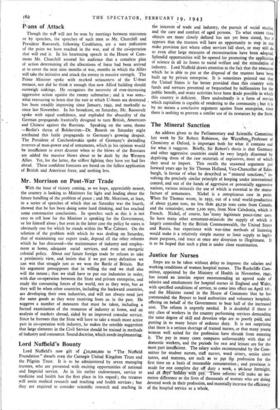Pans of Attack
Though the wa? will not be won by meetings between statesmen or by speeches, the speeches of such men as Mr. Churchill and President Roose.velt, following Casablanca, are a sure indication of the point we have reached in the war, and of the co=operation that will end it. In his heartening speech in the House of Com- mons Mr. Churchill assured his audience that a complete plan of action determining all the allocations of force had been arrived at to cover the next nine months of war, months in which the Allies will take the initiative and attack the enemy in massive strength. The Prime Minister spoke with marked seriousness of the U-boat menace, nor did he think it enough that new Allied building should outweigh sinkings. He recognises the necessity of ever-increasing aggressive action against the enemy submarine ; and it was some- what reassuring to learn that the rate at which U-boats are destroyed has been steadily improving since January, 1942, and markedly so since last November. In his broadcast, on Saturday, Mr. Roosevelt spoke with equal confidence, and exploded the absurdity of the German propaganda frantically designed to turn British, Americans and Chinese against the Russians. Speaking on the same, theme —Berlin's threat of Bolshevism—Dr. Benesh on Saturday night attributed this futile propaganda to Germany's growing despair. The President of Czechoslovakia spoke of Germany's dwindling reserves of maxi-power and of armaments, which in his opinion would be insufficient to avert disaster when to the bloWs of the Russians are added the massive blows about to be dealt by the Western Allies. Yet, for the latter, the stiffest fighting they have yet had lies ahead. These confident forecasts are based on the fullest application of British and American force, and nothing less.


























 Previous page
Previous page